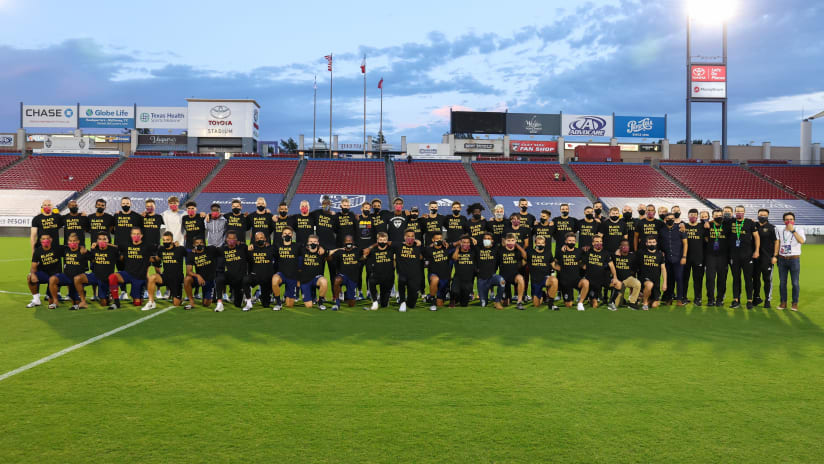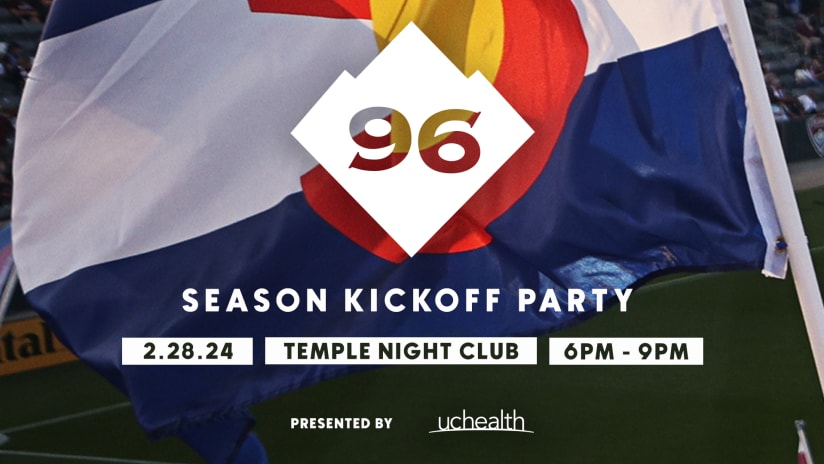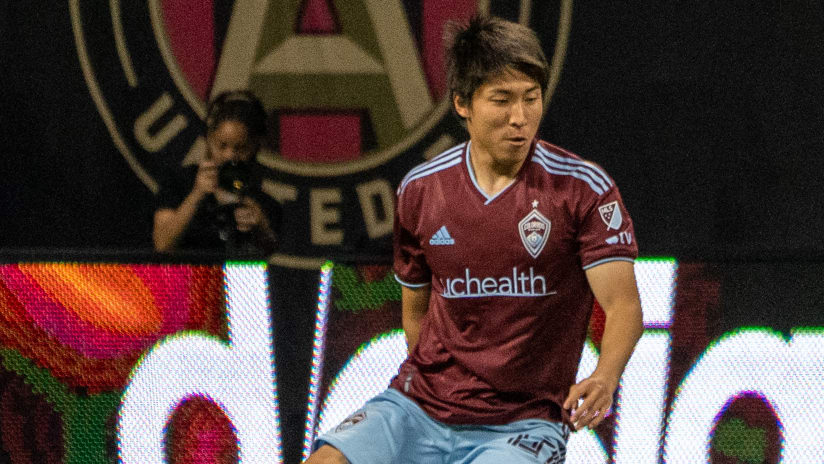On August 26, 2020, the Colorado Rapids and FC Dallas joined professional sports teams across the U.S. in protest, taking a stand against ongoing social injustice.
The united decision across the teams and sports leagues alike to refuse to play marked a historic day in America. In all, games were rescheduled in MLS, NBA, WNBA, MLB, and in the following days, in the NHL.
While this was the first time such a wide-scale, united approach was taken across American sports leagues, sports and peaceful protest have a history of going hand in hand. From Tommy Smith and John Carlos raising their fists on the podium at the 1968 Olympics all the way to Colin Kaepernick first kneeling during the national anthem prior to NFL games, sports have provided an avenue for players to bring societal changes into motion.
In celebration of Black History Month, we talked to Jonathan Lewis, Kellyn Acosta, Auston Trusty, Clint Irwin, head coach Robin Fraser and team operations manager Alyne Moore about the protest to give a behind-the-scenes perspective of what the day was really like and tell the story of the lasting impact it made on the team and its players. They describe the gravity of the decision, in their own words.
Lewis: We flew in, since that was the season and what we were doing—flying in the same day as the game. Coming on the bus, we were seeing some of the NBA games that were on the East Coast that started off with this movement, seeing that some of these guys were not taking the court because of all the stuff that was going on in the world in social injustice.
Acosta: People were kind of uneasy, like, “All this is going on, and I’ve got to go out there and try and perform?”
Fraser: I sit at the front of the bus, so I don’t hear everything that’s going on back there, but there were some rumblings about what had happened.
Lewis: We started to collaborate amongst ourselves in the back of the bus. A few of the guys, one of the heads of the Black Players Coalition, Kei Kamara, and I started talking about it. It was me, him, Kellyn, Lalas Abubakar. We were seeing the empowerment of the NBA players not going on the court, and we were saying, “We should follow their lead.”
Acosta: There was news kind of swirling, like, “This has been talked about,” but, actually executing it, we didn’t really put that into plan until we got to the stadium.
Moore: Everyone treated it as business as usual, but at the same time, we all knew, and not just the Black staff and Black players, but the entire team knew that something was off.
Fraser: I heard that, maybe right when we got to the stadium, Kellyn spoke to a couple of guys from Dallas and word got back to me that they were talking about potentially boycotting the game.
Acosta: Guys around the league were in communication with each other. We were communicating with Dallas. We were already at the locker room, so we were just in the hallway, talking to each other via text, via phone call.
Trusty: For me, that was my first start, so that was a big game for me. I was hyped, I was doing my thing… We got to the stadium in Dallas, got our temperatures checked, and then we sat down for 10-15 minutes and all of the sudden Kei came over to me and Lalas, brought us outside and said, "Hey, we want to boycott this game to take a stand.” And I was all for it… Obviously I wanted to play, but there was a much bigger thing going on than this was my first start. These are people’s lives going on, and my life, living as an African American in America.
Fraser: I went and spoke to Pádraig [Smith] and said that this was potentially brewing. He was immediately 100% supportive.
Lewis: In the locker room, we started collaborating with some of the rest of our teammates, and, basically, we all agreed that this stuff is more than just a game.
Irwin: When we talked about it, you could just see the weight on guys, and it was tough to see as a teammate. I’m not someone who can specifically speak to those experiences, but I think all you have to do is look at your teammates to understand the pain and anguish that it causes.
Acosta:
We brought it to the attention of Robin because, as a coaching staff, they’re not in the same locker room. They have their own coaches’ locker room, so they’re over there, talking amongst themselves, kind of prepping for the game. Us players, the veterans
,
had a meeting and then the Black players had a meeting with Robin as well. He was all on board. He understood. He was like, “Yeah, this is the right thing to do. This is bigger than us.”
Lewis: We had a meeting in the hallway. A few of their players, Reggie Cannon, Fafa Picault, Matt Hedges came out, so it was a few of their players, a few of our players, our coach, their coach, and we just all discussed it, and we all agreed. We came to a unified decision, between the referees, the two teams, the general managers of both teams—they all had an input into what we think was the right thing to do. We all came to the decision together.
Acosta: It really helped us when NBA teams and baseball teams participated in that. I think it gave us an opportunity to be more comfortable and more confident in doing so. It was huge. I think it just shows how in solidarity we are.
Irwin: There wasn’t any dissension... It just was our way to show that it’s bigger than all of us. And it’s up to us to bring attention to it and use the platform that we have.
Trusty: That was probably the first time where it was a thing for the team. Before, we had conversations with people about certain stuff, everybody talks, but that was a team thing. And that was the first time it became bigger than just talking to the other African American guys or just taking it in by yourself. Now, you know everyone is with you.
Acosta: The one that was the most vocal that I remember was actually Clint Irwin. He was like, “This is something that we need to do, guys. I’m really proud of each one of you, and, you know, this is bigger than football.” And that was a proud moment for me. It was special to see a guy who’s white, in Clint, and where he understood… It was just special to see all my teammates be on board as well… I think it drew us all a little bit closer.
Irwin: I’m proud to be teammates with guys like Kellyn, to play for a guy like Robin, and of all of our teammates. They’ve really opened my eyes to things that go on in communities that I’m not from and totally familiar with. In my experience, it’s important to listen and to understand that my experiences, as an adult white male, growing up, are not always the same as someone else’s. I think it’s a good lesson for all of us.
Lewis: You could definitely see it brought people together. It showed how unified everybody on both teams, everybody in the league, everybody in the sports world, how unified everybody was on these issues… Uniting all together with one goal in mind. You felt that in the air.
Trusty: It was a really powerful moment knowing the kind of guys you have in the locker room because some guys may not agree with what you were doing, you know? But everyone was up for it, and everyone totally understood what the Black players on the team were feeling and how they were feeling, what they were talking about and what it was for.
Moore: For us, it was something that we were all 100% going in as a unit, and we made sure all of our decisions were like that last year. Even back before the Dallas game, back at our last training session before Orlando, I called a meeting with Robin and the players on the field, and Kei brought it up and we discussed everything going forward with Orlando and everything as it related to Black Lives Matter and the Black Player’s Coalition, and what we were going to do... And we stuck with that the entire year and never wavered and had those tough conversations, emotional conversations, before training, before flights, on the flights, and it’s made us a stronger group.
Fraser: The momentum was growing. Steps were being taken that far exceeded anything I’d seen in my time in this country. People were willing to stand up, regardless of circumstances, the environment, who’s watching, who’s not. In spite of everything that was going on, the only thing that really mattered was doing the right thing. It wasn’t just the Black players but all the players.
Trusty: For me, to make history, taking a stand… It hasn’t really happened like that before in sports. Nothing on a team-wide and league-wide and sports-wide size. The only way to really describe it is that it is extremely powerful, and I’m happy and blessed to be a part of an organization and a league that understands.
Fraser: That night, I will always remember because it felt very heavy. It felt significant and different than anything I had seen in 40 years in this country.
Lewis: Now, people can’t forget. It can’t be that some injustice happens, and then we don’t talk about it. Every day has to be a fight, and every day people have to be reminded, and that’s the only way, to me, I feel like things will change.




